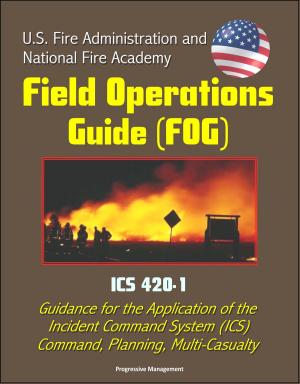Vulnerability of the United States Railroad System to Terrorist Attacks: Risks to Amtrak Passenger Trains, Tank Cars, Cyber Attacks, Historic Lac-Megantic Oil Train Derailment, Screening Measures
Nonfiction, Reference & Language, Transportation, Railroads, Social & Cultural Studies, Political Science| Author: | Progressive Management | ISBN: | 9781370591015 |
| Publisher: | Progressive Management | Publication: | January 23, 2017 |
| Imprint: | Smashwords Edition | Language: | English |
| Author: | Progressive Management |
| ISBN: | 9781370591015 |
| Publisher: | Progressive Management |
| Publication: | January 23, 2017 |
| Imprint: | Smashwords Edition |
| Language: | English |
This excellent report has been professionally converted for accurate flowing-text e-book format reproduction. This research focused on the vulnerability of the United States railroad system to terrorist attacks. This research of the railroad system was restricted to long-distance passenger rail (Amtrak) and freight rail. Commuter rail (subways) and Light rail were not considered. This paper examines research regarding how the United States compares in different areas on a global scale and considers options that could mitigate or increase terrorist attacks on the railroad system that is shown to be vulnerable and a primary target for terrorist attacks. The vulnerabilities and threats to passenger and freight rail and the current levels of protection for each are assessed. The paper also reviews the types of threats that could be delivered, how passenger and freight rail are most susceptible to terrorist attacks, and how terrorists could cause the maximum amount of damage and loss of life. The results of this research indicate that the present levels of protection are insufficient, additional levels of protection could be implemented, and that there is a need for contingency plans to protect the railroad system in the event a major attack occurs.
A high cause for alarm is the possibility of mass casualties by targeting railroad tank cars that carry hazardous materials. An accidental derailment of trains that are transporting tank cars filled with toxic inhalation chemicals or flammable liquids such as oil, has always been a concern. Generally, tanks cars hold up to 20,000 gallons of chemicals such as hydrochloric acid or up to 30,000 gallons of oil each. Now the possibility of intentional derailment or detonation of trains by terrorists carrying these dangerous products in a populated area has multiplied the security risk. Controversy has also erupted over the railroad companies moving these dangerous products through populated areas in a so-called cloud of secrecy. After 9/11, information on the scheduled movement of these products was restricted with the argument of keeping this type of information from those who could use it to cause harm. The people of these urban and rural areas argue that without knowing when the trains are coming through and what they are carrying, they have no chance of protecting themselves in case of an incident involving these dangerous products. Both sides of this issue certainly have merit and a solution will require a balance of common sense and the need for protection.
As of now passenger, baggage, and cargo screening of passenger trains is random and a possible major vulnerability to attack by terrorists. Globally it is reported that using some type of bomb is the leading method of terrorist attack and accounts for approximately 75 percent of attacks on passenger trains. The airline industry has dealt with the issues that arise with providing strict security measures. These issues such as delays, privacy rights, and developing new technology have certainly been a challenge for the airlines, but they always have the tragic history of the 9/11 attacks to support their expensive and sometimes problematic systems. However, even with the expense, problems, and delays there are now many extra levels of security that are not present in the other modes of transportation.
This excellent report has been professionally converted for accurate flowing-text e-book format reproduction. This research focused on the vulnerability of the United States railroad system to terrorist attacks. This research of the railroad system was restricted to long-distance passenger rail (Amtrak) and freight rail. Commuter rail (subways) and Light rail were not considered. This paper examines research regarding how the United States compares in different areas on a global scale and considers options that could mitigate or increase terrorist attacks on the railroad system that is shown to be vulnerable and a primary target for terrorist attacks. The vulnerabilities and threats to passenger and freight rail and the current levels of protection for each are assessed. The paper also reviews the types of threats that could be delivered, how passenger and freight rail are most susceptible to terrorist attacks, and how terrorists could cause the maximum amount of damage and loss of life. The results of this research indicate that the present levels of protection are insufficient, additional levels of protection could be implemented, and that there is a need for contingency plans to protect the railroad system in the event a major attack occurs.
A high cause for alarm is the possibility of mass casualties by targeting railroad tank cars that carry hazardous materials. An accidental derailment of trains that are transporting tank cars filled with toxic inhalation chemicals or flammable liquids such as oil, has always been a concern. Generally, tanks cars hold up to 20,000 gallons of chemicals such as hydrochloric acid or up to 30,000 gallons of oil each. Now the possibility of intentional derailment or detonation of trains by terrorists carrying these dangerous products in a populated area has multiplied the security risk. Controversy has also erupted over the railroad companies moving these dangerous products through populated areas in a so-called cloud of secrecy. After 9/11, information on the scheduled movement of these products was restricted with the argument of keeping this type of information from those who could use it to cause harm. The people of these urban and rural areas argue that without knowing when the trains are coming through and what they are carrying, they have no chance of protecting themselves in case of an incident involving these dangerous products. Both sides of this issue certainly have merit and a solution will require a balance of common sense and the need for protection.
As of now passenger, baggage, and cargo screening of passenger trains is random and a possible major vulnerability to attack by terrorists. Globally it is reported that using some type of bomb is the leading method of terrorist attack and accounts for approximately 75 percent of attacks on passenger trains. The airline industry has dealt with the issues that arise with providing strict security measures. These issues such as delays, privacy rights, and developing new technology have certainly been a challenge for the airlines, but they always have the tragic history of the 9/11 attacks to support their expensive and sometimes problematic systems. However, even with the expense, problems, and delays there are now many extra levels of security that are not present in the other modes of transportation.















